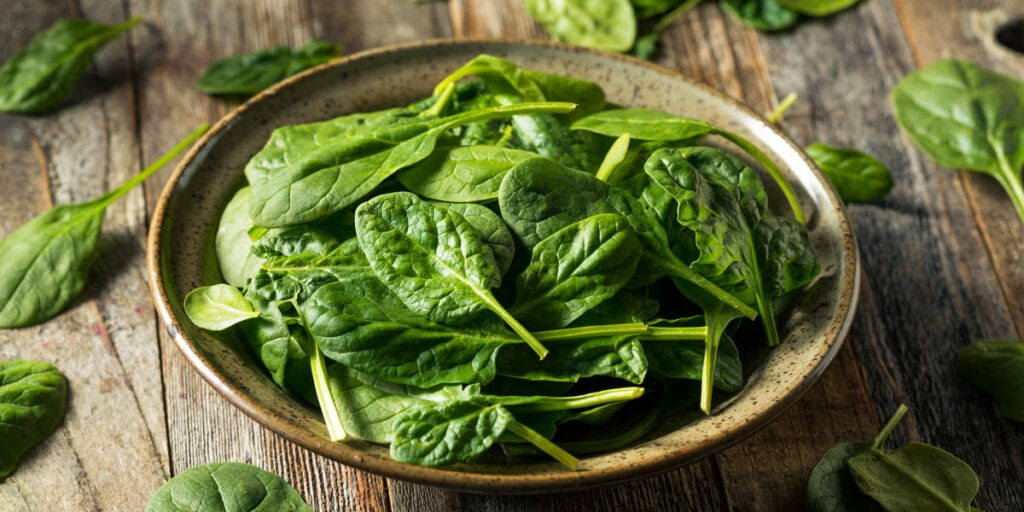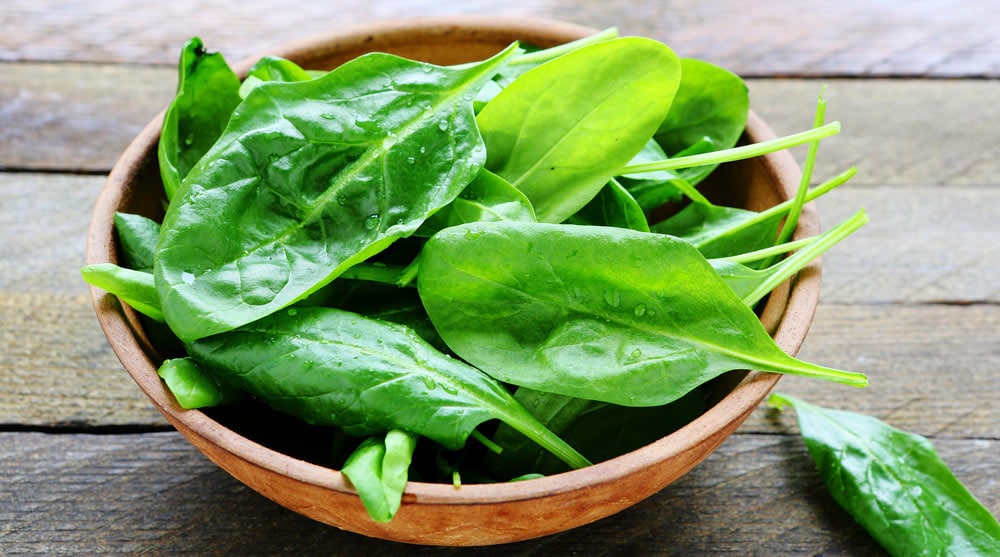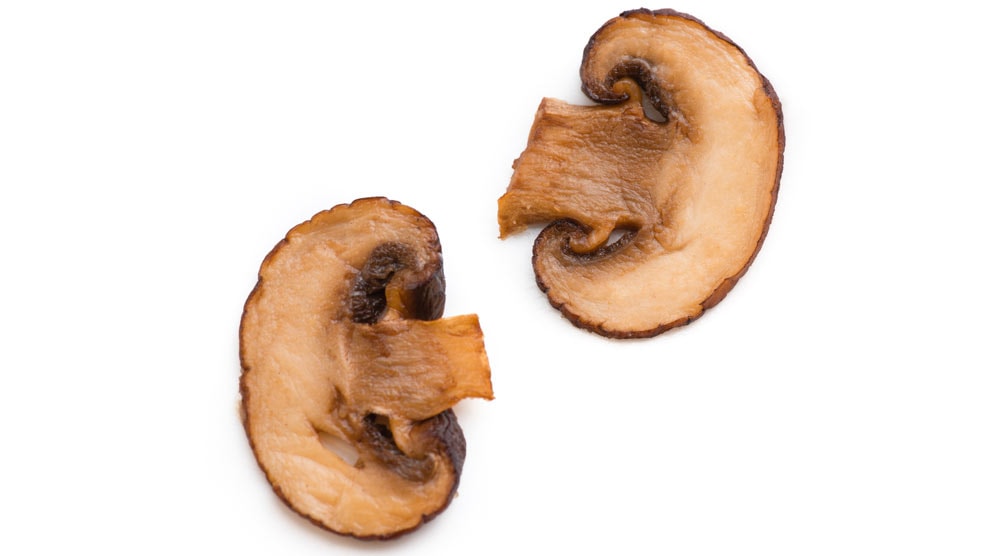Spinach is a leafy green that’s considered a superfood due to its vitamin and mineral content. But is spinach safe for your dog to eat? Read on to find out.
Spinach has seen a surge in popularity in recent years. Just because a food is beneficial for humans doesn’t always mean it’s safe for dogs though.
While spinach is non-toxic for dogs, it contains an ingredient that could be harmful if fed in large quantities. This makes it a controversial veggie to feed your pooch.
Let’s take a closer look at spinach for dogs. We’ll discuss how concerned you should be about your dog eating it, along with the reasons why it’s a vegetable that’s best avoided.
Contents
Is Spinach Safe for Dogs?

As mentioned in the introduction, spinach is not toxic to dogs when eaten in small quantities. If your pet manages to sneak a few spinach leaves while you’re preparing a salad, you probably don’t need to worry.
Unfortunately, there are health problems associated with dogs eating spinach in large quantities or regularly.
Spinach is high in an organic compound called oxalic acid. Studies in humans have shown that eating too much oxalic acid can increase the risk of kidney stones and urinary tract problems. While these issues can affect anyone, oxalic acid is a particular problem for people who are sensitive to the compound and those with existing kidney issues.
Although more studies are required to understand what quantities spinach becomes dangerous to dogs, our canine friends are susceptible to the same health issues.
It’s generally accepted that dogs would need to eat a lot of spinach for calcium oxalate bladder stones to be a concern. However, given the risks, and the fact that dogs don’t need this vegetable as part of their diet, it’s best to avoid feeding spinach to your dog.
“The most common signs of urinary crystals and stones I see in my canine patients are frequent urination, excess thirst, and bloody urine,” says veterinary surgeon Dr Linda Simon. “Some of the breeds most prone to stones include the Lhasa Apso, Bichon Frise, and Shih Tzu.”
Dogs with bladder or kidney issues should never be fed spinach. You should also avoid giving them other foods that are high in oxalic acid, such as green beans and beets.
Does Spinach Provide Health Benefits for Dogs?

There isn’t a strong reason to add spinach to your dog’s diet – especially as it’s linked to certain health conditions. Providing your dog is on a high-quality and nutritionally complete food, he’ll already be getting the nutrients he needs.
Spinach does contain a variety of nutrients and vitamins though. Some examples include:
- Dietary fiber. Spinach is a great source of natural roughage for dogs. The right amount of fiber can promote healthy digestion and bowel movements. Dogs on a weight loss program also feel fuller for longer on a high-fiber diet, although too much can cause loose stools or diarrhea.
- Zinc. While too much zinc can be dangerous, it’s an essential mineral for dogs. Zinc helps maintain a healthy immune system, normal cell development, and efficient thyroid function.
- Vitamin K. Dogs might not need this vitamin in the quantities that humans do, but it can still be advantageous for blood clotting and strong bones.
- Magnesium. Studies have shown this nutrient could help reduce the risk of heart disease and it has anti-inflammatory properties. Magnesium also helps promote a healthy immune system and skin.
- Beta-carotene. This antioxidant, contained in high quantities in spinach, converts to vitamin A. Vitamin A contributes to eye health and bone development.
Given the risks associated with oxalic acid, it’s important to speak with your vet or a qualified canine nutritionist before adding spinach to your dog’s diet.
“If you feel your dog’s diet lacks fiber, I’d advise a high-fiber dog food or a daily fiber supplement rather than spinach,” says Dr Simon. “Low fiber can lead to a range of issues including stool problems and ongoing anal gland impactions.”
When introducing any new food, you should always do so gradually. This allows your dog’s digestive system to get used to the food and gives you time to monitor for allergic reactions.
Food allergies can cause symptoms immediately or up to several days after consumption. Common allergy symptoms include itchy and irritated skin, stomach upsets, and even respiratory problems. If your dog has a reaction to any food, you should seek immediate veterinary advice.
How Should Spinach Be Served to Dogs?
Unless you’ve checked with your vet first, it’s best not to feed spinach to your dog.
If you decide to give spinach to your dog, however, make sure it’s lightly steamed, chopped, and served without any spices, seasoning or oils.
Boiling spinach destroys a lot of the nutritional value, but raw spinach can be difficult to digest. Steaming preserves the nutrients more efficiently, while breaking down some of the toughest fiber.
It’s also best to avoid giving seasoned spinach to your dog, as common seasonings can be dangerous or unhealthy.
For example, spinach is sometimes sauteed in rich butter. Too much saturated fat in your dog’s diet can lead to obesity, and there is a risk of developing pancreatitis. This gastric condition can be chronic and, in severe cases, life-threatening. Garlic and onion are also often added for additional flavor, but both are toxic to dogs.
Note: Make sure the spinach is thoroughly washed to remove any pesticides.
Conclusion
Spinach isn’t toxic to dogs when fed in moderation. If your dog eats a few leaves occasionally, this shouldn’t be a problem.
However, although this leafy green is considered a nutrient-rich superfood, it isn’t the best veggie to add to your dog’s diet.
Because it’s so high in oxalic acid, it could increase the chances of your dog developing bladder or kidney stones. Spinach is also often cooked with seasoning that’s unhealthy or dangerous for dogs.
Considering there are plenty of vegetables that don’t carry the same risks, and dogs don’t need additional veggies in their diet, it’s best to avoid giving your dog spinach.




